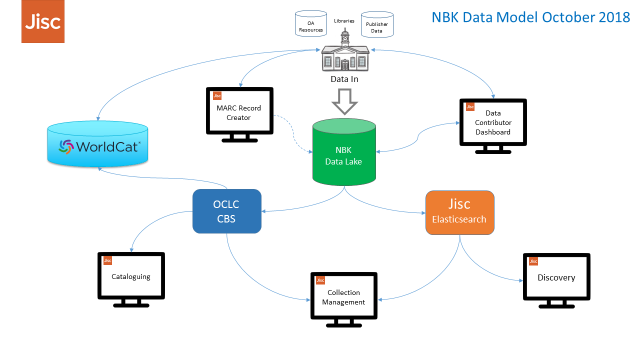We have been busy working on the National Bibliographic Knowledgebase (NBK) project over the last few months, and would like to update you on some key areas of progress.
Updated NBK Data Model
As part of an evolving strategy to optimise prospects for delivering the best possible functionality that the NBK can provide we have formally opted to design a live service delivery model that is reliant on a dual platform approach.

The above figure represents how we see data flowing into the various components and interfaces of the NBK system. The crucial innovation with this data model over the original conception for the system is the inclusion of an Elasticsearch indexing engine which will provide speed and flexibility for the discovery layer. The division of data into a cataloguing instance and a discovery instance also greatly simplifies issues around data licensing, rights & reuse. All data that is sent to the OCLC CBS system for inclusion into the copy cataloguing system will be of reasonable or good quality and will be rights cleared for the NBK community to download and reuse in MARC format. All data that is submitted for inclusion into the NBK will be included in the Discovery instance of the system and will represent a comprehensive view onto the holdings of NBK libraries.
NBK Interface Development (Feb / Jul 2019)
We are working towards launching some key components of a live NBK service in early February to replace the currently available beta interface but we are intending this to be a ‘soft launch’, as none of the NBK services will by that point be available in full. We are working with a design and UX agency to design the new resource discovery interface, and we hope to be able to show you these designs, along with the new service names, in the first week of February.
The full launch of the NBK services will be at the end of July 2019.
NBK Community Survey
The NBK Community Data Groups ran a survey over the summer and the response rate was excellent (99 institutions completed the survey). The responses have provided us with a fascinating set of data which has already proved invaluable in informing our work. A headline summary of the results is now available on the CCM Blog. The slides feature visualisations of a selection of 21 questions that the extensive survey posed to the community.
Library figures
We now have 170 institutions who have agreed to participate in the NBK. Of those, 96 have sent data for inclusion in the database. You can see the most current list of contributing libraries here.
If you have any questions or comments about the NBK, please contact nbk.copac@jisc.ac.uk

